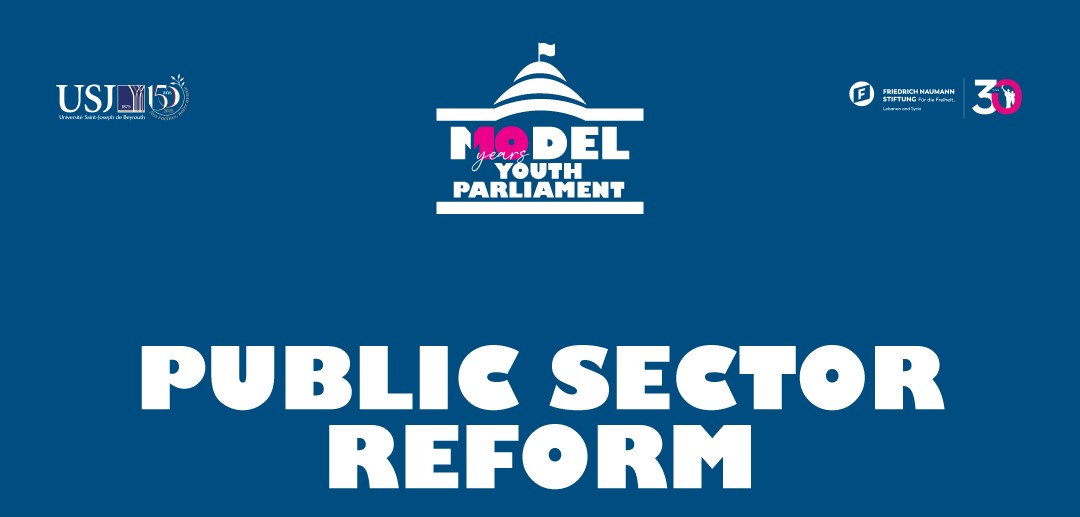Model Youth Parliament
Reforming the Public Sector

Written by MYP10 mentors Anthony Saad and Samir Ghafari
The year 2025 marks a symbolic milestone for several Lebanese institutions. Among them, the Model Youth Parliament (MYP) celebrates its tenth edition, reaffirming its role as a catalyst for an engaged, aware, and ambitious Lebanese youth. At a time when state dysfunction has reached critical levels, this year’s legislative proposals tackle some of Lebanon’s most pressing challenges — none more urgent than the need to reform the public sector.
Lebanon’s public administration has long been associated with inefficiency, corruption, and rigid bureaucracy. Without meaningful structural change, efforts at economic recovery, social equity, and democratic renewal will remain stalled. This is why participants in MYP10 are proposing a draft law to establish a Public Sector Restructuring Authority tasked with designing and overseeing the reform process.
The Problem: A Fragmented, Inefficient, and Politicized State Apparatus
For decades, Lebanon’s public sector has suffered from overstaffing, overlapping mandates, and deep clientelist networks. Many public institutions operate with unclear responsibilities, outdated procedures, and politicized appointments. Civil service recruitment is often shaped more by sectarian quotas than by competence or need.
Despite the presence of oversight bodies such as the Civil Service Council, the Central Inspection Authority, and the Ministry of Administrative Development, coordination between them remains weak. Without a unified strategy or executive authority to implement reforms, efforts to modernize the public sector have remained partial, slow, and largely ineffective.
This dysfunction not only affects the state’s ability to serve citizens efficiently — it also leads to massive financial waste, discourages investment, and erodes public trust in government institutions.
What the Law Proposes
The draft law proposes the creation of a new, cross-institutional body: the Public Sector Restructuring Authority (هيئة إعادة هيكلة القطاع العام).
- Article 1 establishes the Authority in addition to existing state institutions and explicitly names its members: representatives from the Ministry of Administrative Development, the Civil Service Council, the Central Inspection Authority, the Court of Audit, the State Council, and civil servants themselves.
- Article 2 mandates the Authority to conduct comprehensive assessments of Lebanon’s public institutions and human resources — including a detailed employee census. Based on this, the Authority will draft a binding roadmap to restructure the public sector and reduce waste of both financial and human resources.
- The Authority’s plan and decisions will be binding on all public administrations and must be implemented by the Council of Ministers, ensuring its recommendations do not remain purely advisory.
- Article 3 stipulates that the law enters into force upon publication in the official gazette.
This centralized approach avoids duplication of responsibilities and gives the reform process both legitimacy and enforcement power across state institutions.
Why It Matters
Public sector reform is not an abstract ambition — it is the first step toward rebuilding a functional, credible state. By creating a dedicated authority that brings together all relevant oversight bodies and gives it binding power, this draft law addresses the two main weaknesses of past reform efforts: lack of coordination and lack of implementation.
For citizens, this reform means more efficient public services, less corruption, and better use of taxpayer money. For civil servants, it promises greater clarity in roles, protection from political interference, and the chance to contribute to a modern and merit-based administration.
At its core, this proposal is about restoring professionalism, planning, and public interest to state institutions. It reflects the determination of Lebanon’s youth to move beyond patchwork reforms and toward a new public sector that actually serves the people.